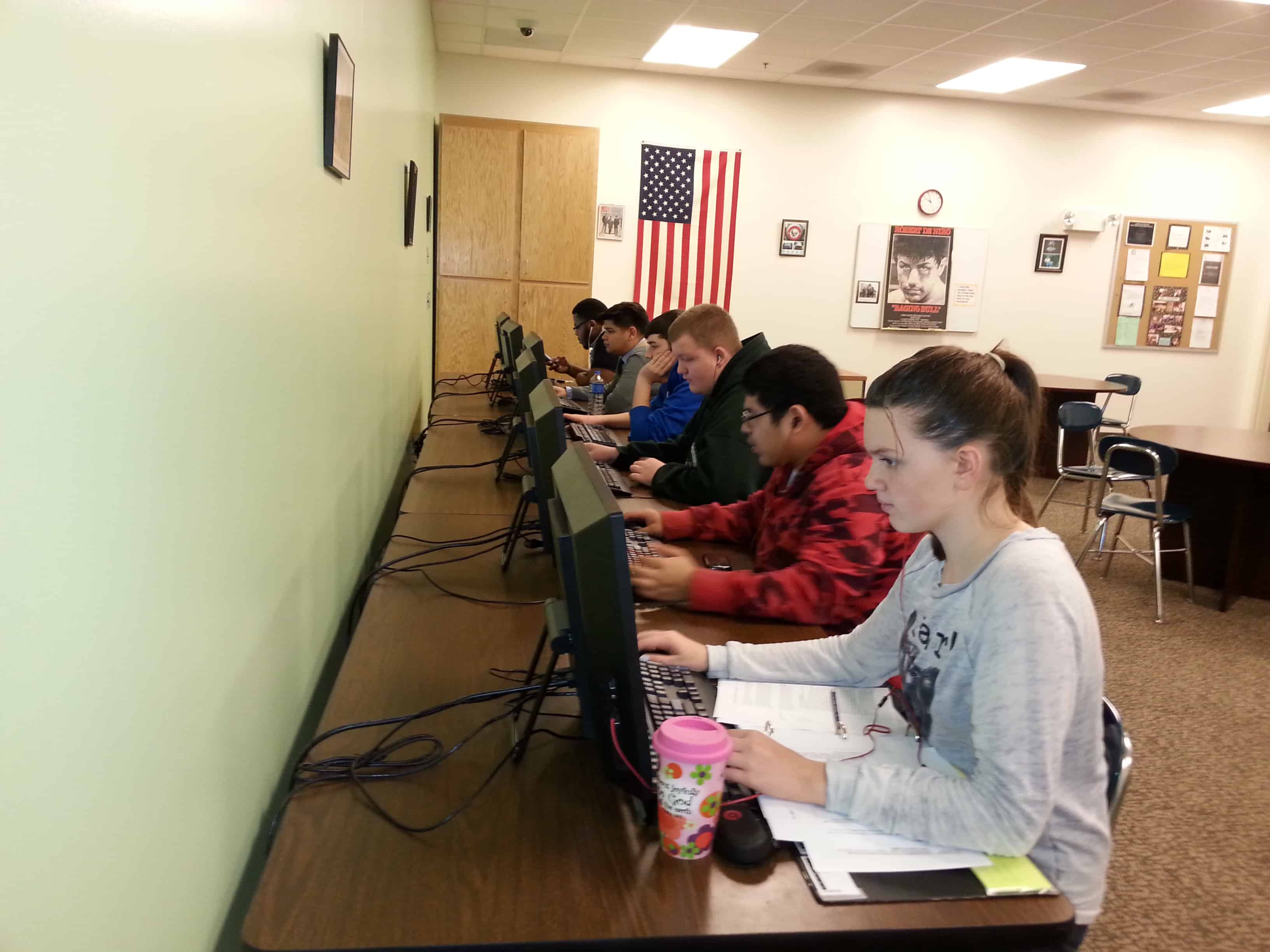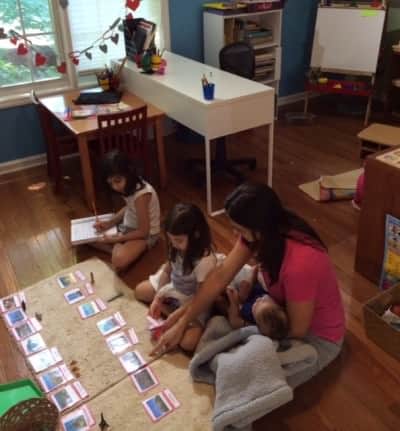For years, achieving an amicable homeschool-public school partnership seemed unthinkable. Prior to 1985, homeschooling was neither accepted nor legal in North Carolina. Much has changed since, to advance educational freedom and to secure homeschooling’s place in the pantheon of K-12 options. But skepticism between public schools and homeschools has endured. Could collaboration replace suspicion?
Enterprising families and innovative educators are showing it can. In Concord, North Carolina, Christin McDowell serves as the coordinator for HomeReach, a part-time learning program offered to homeschoolers by Cabarrus County Schools. A public school teacher, McDowell possesses an additional, and unimpeachable, credential: “I am an original homeschool student from the 1980s,” she says.
McDowell, who joined HomeReach after its 2013 pilot year, was skeptical at the program’s inception. “In my childhood, public school was never the friend of the homeschooler,” she says.
But HomeReach’s respectful collaboration with homeschool parents has turned her into a proponent of partnership. This fall the program will begin its third year, enrolling 30-35 students per semester in online high school classes―from AP English to upper-level math. Students enroll in two virtual courses, completing those and other studies at home.
“This is really very progressive to see it as a partnership,” says McDowell.
A hybrid approach to schooling
Not far from Concord, Larry Rogers is also challenging entrenched educational paradigms. A public high school principal for Iredell-Statesville Schools, Rogers leads a Troutman campus that houses the Career Academy and Technical School and the online learning program, iAcademy. Through iAcademy, Rogers serves public, private, and homeschool students.
Flexibility is the fulcrum of the iAcademy model. Homeschool students enroll for a minimum of two classes; both can be online, “or one could be online,” says Rogers, with the other class taking place in a traditional public school.
This brand of customization is catching on. This year, iAcademy will enroll 55 homeschoolers. “The homeschool parents who have been [involved] in our program actually help us recruit,” says Rogers.
At HomeReach and iAcademy, students enroll at no cost. Public schools draw funds for students’ enrollment. “It’s a win-win,” says Rogers.
Both programs offer educational portability and the ability to maintain home-based studies. However, homeschoolers are classified as part-time public school students rather than registered homeschool students. Dr. James Williams, principal of HomeReach and the Performance Learning Center where HomeReach is based, says of homeschoolers: “They enroll with us so that they can access our course offerings and teacher resources…I would consider it more of a hybrid because in reality, the parent is supplementing their homeschool offerings with our courses.”
Around classes, consensus is building
Elsewhere in N.C., registered homeschoolers may enroll, for a fee, in online courses through the NC Virtual Public School; classes include honors and AP options. The typical cost per course is in the $400 to $500 range, depending on the class. Because of a 2013 law redefining homeschools, parents now have greater flexibility to supplement their teaching with paid outside courses, through NC Virtual Public School or other providers. Local districts set their own policies regarding homeschoolers’ enrollment in a public school class.
The Career and College Promise program―launched in 2012 as a partnership between the NC Community College System, the Department of Public Instruction, and the UNC system and other colleges―is especially popular with homeschoolers. Paid with funds allocated by the state legislature, CCP offers eligible juniors and seniors from home, private, or public schools an opportunity to earn tuition-free college credit; participating homeschoolers are dually enrolled in community college and homeschool. According to Chreatha Alston, engagement services manager for the NC Community College System, 277 homeschool students “entered the CCP program statewide” in 2014.
Though limited in scope, partnerships reflect a growing shift in perception playing out nationwide. Debate surrounding “equal access,” the term for allowing homeschoolers’ participation in public school activities, is not contentious―at least not with the American public. In 2013 Phi Delta Kappa/Gallup’s annual poll on the public schools assessed Americans’ views on equal access. Findings revealed strong support: 75 percent said homeschoolers should be allowed to enroll part-time in public schools; 80 percent favored allowing homeschoolers’ participation in public school sports or activities.
Popular support has propelled passage of equal access laws in numerous states. According to a July 2015 report from the Education Commission of the States, 26 states “allow homeschooled students to participate in extracurricular or co-curricular activities during or after school, attend academic classes at a local public school part-time, or both.”
NC public school sports off-limits
In North Carolina, homeschoolers’ involvement in interscholastic athletic programs remains elusive. This spring state lawmakers in both chambers introduced legislation that would permit homeschool students to participate in public school sports (and extracurricular activities, in the case of the senate bill). These bills, like similar ones before, have not secured passage.
Reconciling the benefits of equal access with fears of encroachment has proven challenging. North Carolinians for Home Education adopted a “neutral stance” on legislation introduced in the state senate this spring, applauding its provision for students “in areas where there are no homeschool opportunities available,” but expressing concern that athletic eligibility requirements could squash instructional freedom.
The North Carolina High School Athletic Association, which governs the state’s interscholastic athletic program, does not favor homeschoolers’ participation on public school sports teams. NCHSAA’s position, says interim commissioner Que Tucker, is “to support the rules and regulations that our membership has endorsed and put in place,” which require athletes to be enrolled and regularly attending the school they represent. Tucker says schools worry about keeping up with homeschoolers’ eligibility requirements; coaches, she says, express concern about “students who are not enrolled in school taking a spot away from a student who is enrolled in school.”
For one group of homeschoolers, however, debate over equal access is long over. N.C. homeschoolers eligible to attend military base schools administered by the Department of Defense Education Activity (DoDEA) may participate in classes, clubs, and sports. DoDEA, which operates North Carolina school districts at Camp Lejeune and Fort Bragg, has sanctioned the provision of military base school resources for homeschoolers since 2002.
Statewide, most N.C. homeschool families are educating their children without help from public schools. Even if public opportunities increased, many would likely continue to do so.
But homeschoolers desiring greater access to public resources or a hybrid approach to education have reason to be hopeful. “I get lots of calls from other [school] systems,” says Larry Rogers. Are we on a path to sustained, widespread partnership? Time will tell. For now, interest in academic collaboration, at least, is building.



